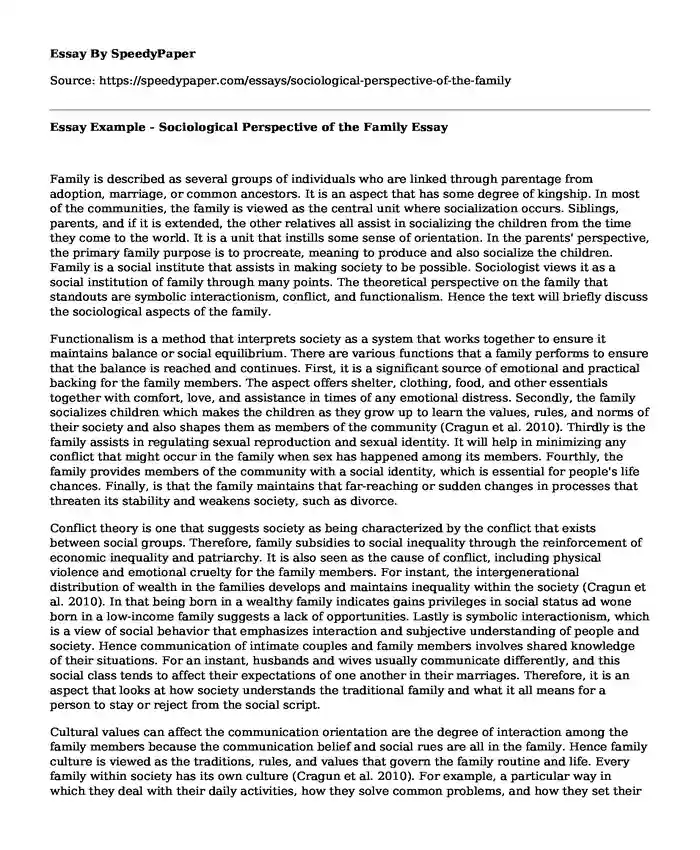
| Type of paper: | Essay |
| Categories: | Family Society Social psychology Intercultural communication |
| Pages: | 3 |
| Wordcount: | 722 words |
Family is described as several groups of individuals who are linked through parentage from adoption, marriage, or common ancestors. It is an aspect that has some degree of kingship. In most of the communities, the family is viewed as the central unit where socialization occurs. Siblings, parents, and if it is extended, the other relatives all assist in socializing the children from the time they come to the world. It is a unit that instills some sense of orientation. In the parents' perspective, the primary family purpose is to procreate, meaning to produce and also socialize the children. Family is a social institute that assists in making society to be possible. Sociologist views it as a social institution of family through many points. The theoretical perspective on the family that standouts are symbolic interactionism, conflict, and functionalism. Hence the text will briefly discuss the sociological aspects of the family.
Functionalism is a method that interprets society as a system that works together to ensure it maintains balance or social equilibrium. There are various functions that a family performs to ensure that the balance is reached and continues. First, it is a significant source of emotional and practical backing for the family members. The aspect offers shelter, clothing, food, and other essentials together with comfort, love, and assistance in times of any emotional distress. Secondly, the family socializes children which makes the children as they grow up to learn the values, rules, and norms of their society and also shapes them as members of the community (Cragun et al. 2010). Thirdly is the family assists in regulating sexual reproduction and sexual identity. It will help in minimizing any conflict that might occur in the family when sex has happened among its members. Fourthly, the family provides members of the community with a social identity, which is essential for people's life chances. Finally, is that the family maintains that far-reaching or sudden changes in processes that threaten its stability and weakens society, such as divorce.
Conflict theory is one that suggests society as being characterized by the conflict that exists between social groups. Therefore, family subsidies to social inequality through the reinforcement of economic inequality and patriarchy. It is also seen as the cause of conflict, including physical violence and emotional cruelty for the family members. For instant, the intergenerational distribution of wealth in the families develops and maintains inequality within the society (Cragun et al. 2010). In that being born in a wealthy family indicates gains privileges in social status ad wone born in a low-income family suggests a lack of opportunities. Lastly is symbolic interactionism, which is a view of social behavior that emphasizes interaction and subjective understanding of people and society. Hence communication of intimate couples and family members involves shared knowledge of their situations. For an instant, husbands and wives usually communicate differently, and this social class tends to affect their expectations of one another in their marriages. Therefore, it is an aspect that looks at how society understands the traditional family and what it all means for a person to stay or reject from the social script.
Cultural values can affect the communication orientation are the degree of interaction among the family members because the communication belief and social rues are all in the family. Hence family culture is viewed as the traditions, rules, and values that govern the family routine and life. Every family within society has its own culture (Cragun et al. 2010). For example, a particular way in which they deal with their daily activities, how they solve common problems, and how they set their family goal and relate to them. Therefore, it vital for the family to create their own culture or maintain one to avoid any adverse effects of learning within the family. In regards to social inequality, family greatly influences its contribution to society by strengthening patriarchy and economic dissimilarity. For example, family stability is affected and influenced by social class within society. There is a high divorce rate in the impoverished community as compared to the vibrant city, which is highly attributed to the stress the couples are facing, especially financial pressure.
Reference
Cragun, R. T, Deborah, C & Konieczny, P. (2010). Introduction to sociology. Retrieved from: https://florida.theorangegrove.org/og/file/d2dc6098-15e7-a69f-3058-9c61987de846/1/Introduction_to_Sociology-v2.0.pdf
Cite this page
Essay Example - Sociological Perspective of the Family. (2023, Apr 09). Retrieved from https://speedypaper.net/essays/sociological-perspective-of-the-family
Request Removal
If you are the original author of this essay and no longer wish to have it published on the SpeedyPaper website, please click below to request its removal:
- Judaism and Christianity Views on Women, Essay Sample
- Differences in the Wireless Protocols. Free Essay Example.
- Business Calculus Essay Example
- HypothesisH0: r = 0 ("there is no relation when the population correlation coefficient is 0) H1: r > 0 ("there exists a positive relation between IQ and GPA when the population correlation >0) H1: r < 0 (there exists a negative relation between IQ and GPA when the population correlation coefficient is less than 0)
- The Rights of Women, 1913. Paper Sample
- Essay Sample on Renting vs Buying
- Paper Example: Benefits of Brainstorming
Popular categories




